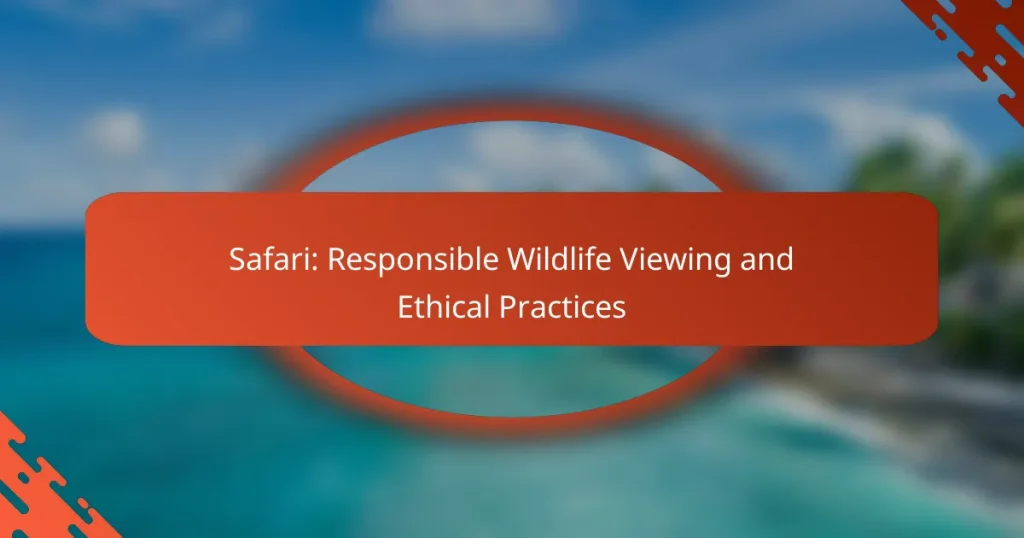Responsible wildlife viewing in Africa is essential for protecting both animals and their habitats. By choosing ethical safari companies that prioritize conservation and sustainable practices, you can enjoy observing wildlife while minimizing your environmental impact and supporting local communities.
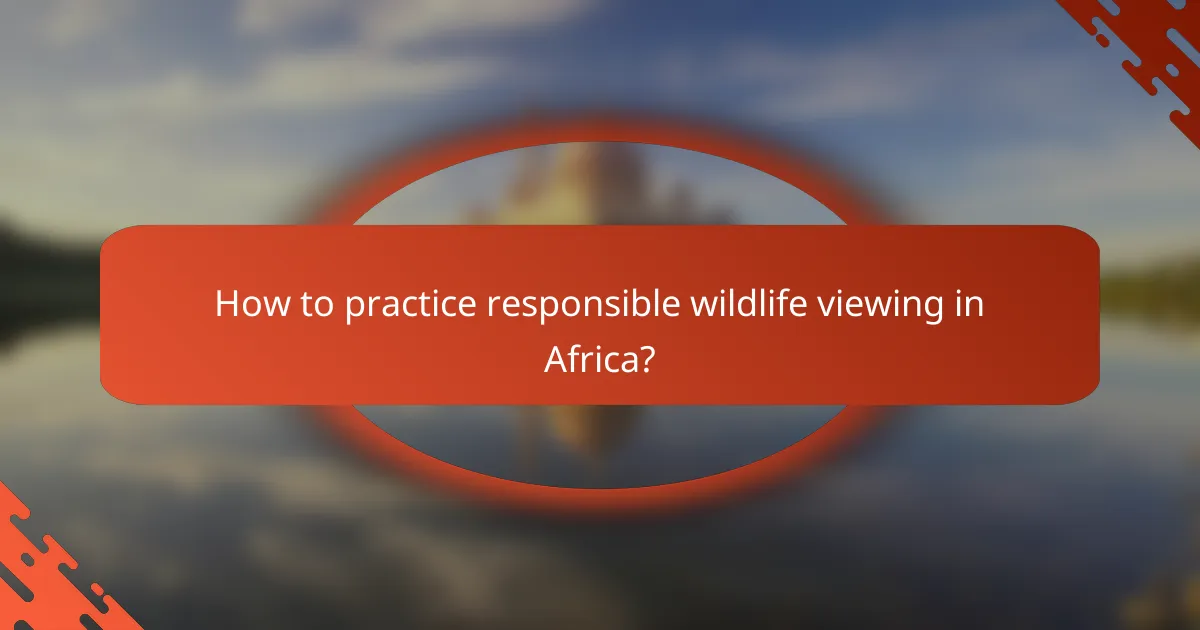
How to practice responsible wildlife viewing in Africa?
Responsible wildlife viewing in Africa involves adhering to ethical practices that protect both animals and their habitats. By following specific guidelines, you can enjoy observing wildlife while minimizing your impact on the environment and ensuring the well-being of the animals.
Follow ethical guidelines
Adhering to ethical guidelines is crucial for responsible wildlife viewing. These guidelines often include respecting wildlife laws, avoiding feeding animals, and not engaging in activities that could harm their natural behaviors. Familiarize yourself with the specific regulations of the national parks or reserves you visit.
Many organizations provide codes of conduct for wildlife tourism, which can help you understand best practices. Always prioritize the welfare of the animals over the desire for a closer encounter.
Choose eco-friendly tours
Selecting eco-friendly tours is essential for minimizing your ecological footprint. Look for operators that are certified by recognized environmental organizations and that prioritize sustainable practices, such as using low-emission vehicles and supporting local communities.
Research tour companies to ensure they have a strong commitment to conservation and responsible tourism. Reading reviews and asking questions about their practices can help you make an informed choice.
Respect animal habitats
Respecting animal habitats is vital for the survival of wildlife. Stay on designated paths and avoid venturing into sensitive areas, as this can disrupt breeding grounds and feeding zones. Be mindful of your surroundings and the impact your presence may have on the ecosystem.
Additionally, consider the time of year when visiting. Some seasons may be more critical for wildlife, such as breeding or migration periods, and your presence could have unintended consequences.
Limit noise and disturbance
Limiting noise and disturbance is key to ensuring a peaceful environment for wildlife. Keep conversations quiet and avoid loud sounds that could startle animals. This is particularly important in areas where animals are sensitive to human presence.
Using binoculars or cameras with zoom lenses can help you observe wildlife without getting too close, allowing you to enjoy the experience without causing stress to the animals.
Observe from a safe distance
Observing wildlife from a safe distance is crucial for both your safety and the animals’ well-being. Maintain a respectful distance to avoid causing stress or aggression in animals. Guidelines often recommend staying at least 25 meters away from most wildlife.
In cases where animals approach you, remain calm and avoid sudden movements. Always prioritize your safety and the safety of the wildlife by adhering to recommended viewing distances set by local regulations.
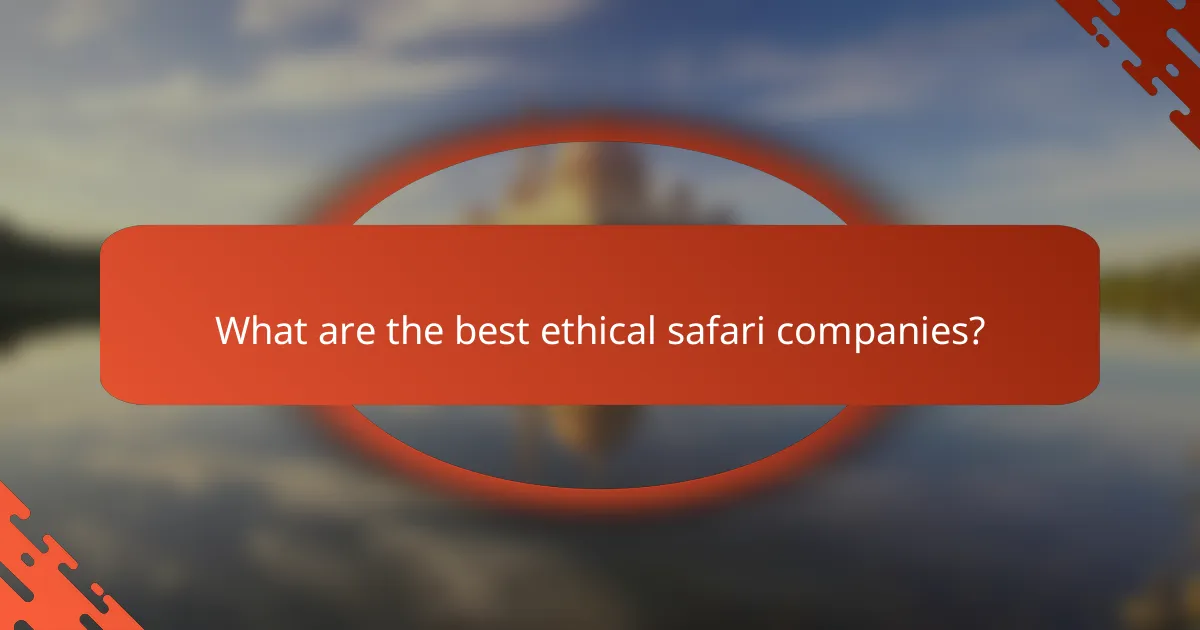
What are the best ethical safari companies?
The best ethical safari companies prioritize wildlife conservation, community engagement, and sustainable practices. These companies offer experiences that respect animal habitats and promote responsible tourism, ensuring that your safari contributes positively to the environment and local communities.
EcoTour Africa
EcoTour Africa is renowned for its commitment to sustainable wildlife viewing. They operate under strict guidelines that minimize environmental impact and support local conservation efforts. Their tours often include educational components, helping travelers understand the importance of preserving ecosystems.
Travelers can expect small group sizes, which enhance the experience and reduce stress on wildlife. EcoTour Africa also collaborates with local communities, ensuring that a portion of profits goes directly to conservation projects and local development.
Wildlife Safari Co.
Wildlife Safari Co. emphasizes ethical wildlife interactions and responsible viewing practices. Their guides are trained to follow best practices that prioritize animal welfare and habitat preservation. This company also advocates for low-impact tourism, often using eco-friendly vehicles and accommodations.
They offer a variety of safari experiences, from guided tours to self-drive options, allowing travelers to choose the level of engagement they prefer. Wildlife Safari Co. is transparent about their conservation efforts, providing insights into how each safari contributes to protecting endangered species.
Responsible Travel
Responsible Travel focuses on creating authentic safari experiences that benefit both wildlife and local communities. They curate a selection of operators that meet high ethical standards, ensuring that travelers can choose from a range of options that align with their values.
This company provides resources and guidelines on how to travel responsibly, including tips on minimizing your footprint and supporting local economies. Their commitment to ethical practices makes it easier for travelers to make informed choices that enhance their safari experience while protecting the environment.
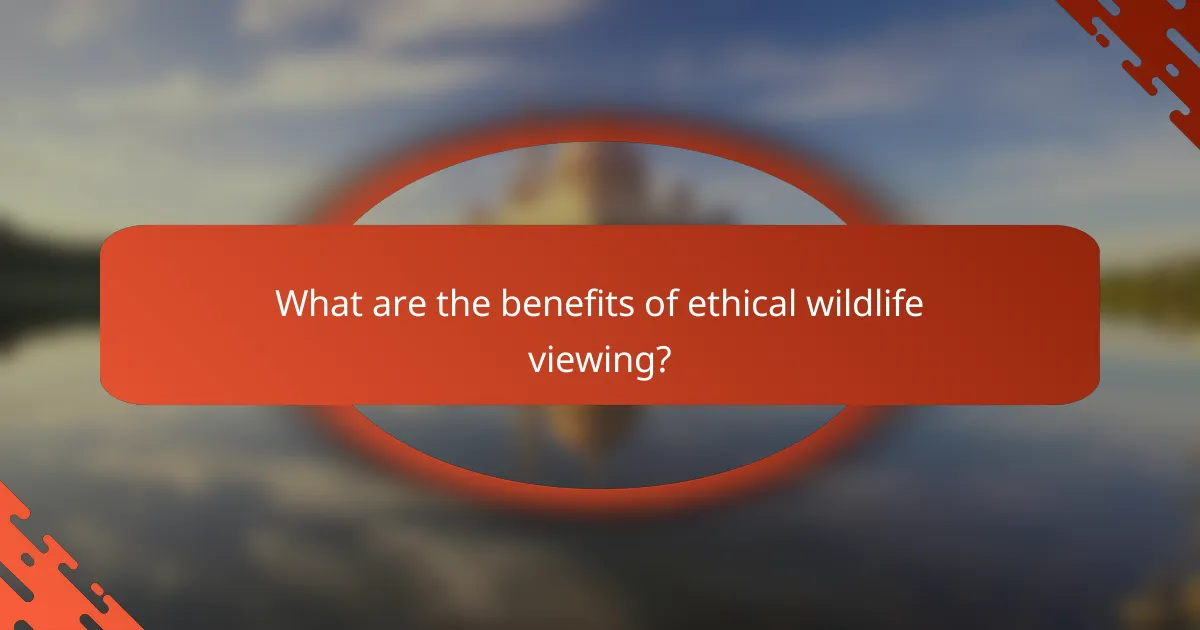
What are the benefits of ethical wildlife viewing?
Ethical wildlife viewing promotes the well-being of animals and their habitats while enhancing the experience for observers. By prioritizing responsible practices, viewers contribute to conservation efforts and foster a deeper connection with nature.
Conservation support
Ethical wildlife viewing directly supports conservation initiatives by generating funds for protected areas and wildlife reserves. Tourists often pay fees that contribute to habitat preservation and anti-poaching efforts, ensuring that ecosystems remain intact.
Participating in guided tours led by certified operators can amplify this impact, as these guides are typically trained to follow best practices that minimize disturbance to wildlife. This creates a sustainable model where both wildlife and local economies benefit.
Enhanced wildlife experiences
Engaging in ethical wildlife viewing leads to more meaningful encounters with animals. When observers respect wildlife and their habitats, they are more likely to witness natural behaviors rather than stressed or altered actions caused by human interference.
For instance, maintaining a safe distance and using binoculars can provide a close-up view without intruding on the animals’ space. This not only enriches the viewing experience but also fosters appreciation for wildlife in its natural environment.
Community engagement
Ethical wildlife viewing encourages community involvement by promoting local cultures and economies. When tourists choose responsible tours, they often support local businesses, such as guides, accommodations, and artisans, which helps sustain communities.
Moreover, many ethical operators engage local residents in conservation efforts, creating educational programs that raise awareness about wildlife protection. This fosters a sense of ownership and responsibility among community members, leading to long-term benefits for both people and wildlife.
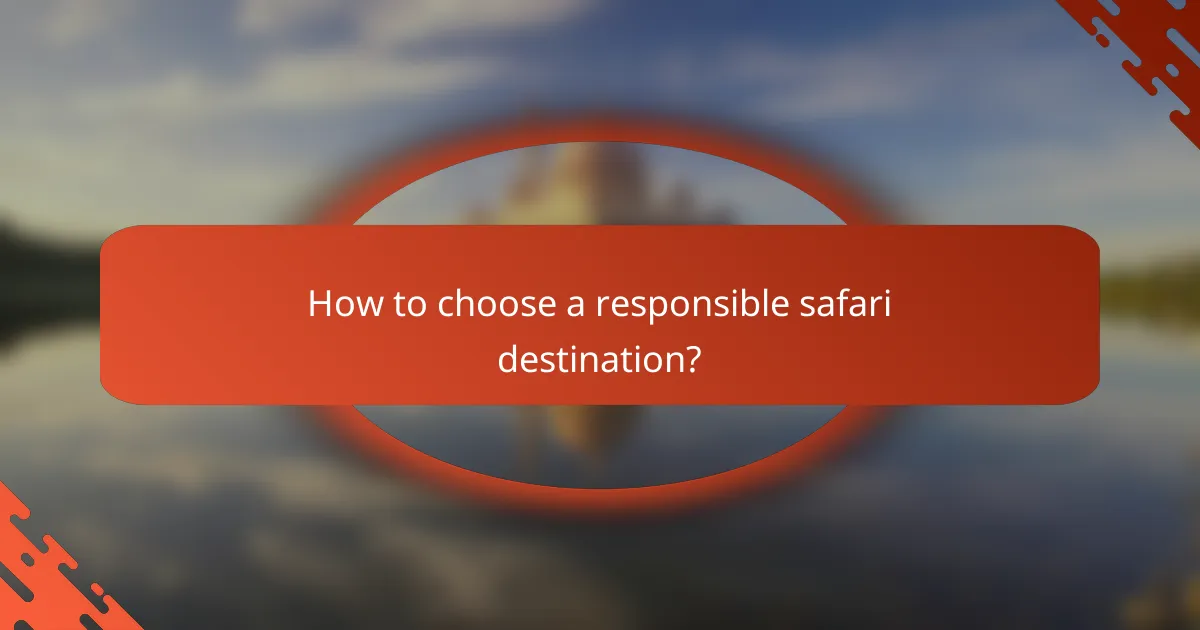
How to choose a responsible safari destination?
Choosing a responsible safari destination involves selecting locations that prioritize wildlife conservation, adhere to ethical practices, and support local communities. Look for operators that demonstrate a commitment to sustainability and have a positive impact on the environment and local economies.
Research conservation efforts
Investigate the conservation initiatives associated with potential safari destinations. Many reputable safari operators partner with wildlife reserves and conservation organizations to protect endangered species and habitats. Look for programs that focus on anti-poaching efforts, habitat restoration, and wildlife monitoring.
Consider destinations that offer educational experiences about local ecosystems and the importance of biodiversity. This not only enriches your safari experience but also supports conservation funding through tourism.
Evaluate local regulations
Understanding local regulations regarding wildlife viewing is crucial for responsible tourism. Regulations may include guidelines on how close vehicles can approach animals, restrictions on off-road driving, and rules about feeding wildlife. Familiarize yourself with these regulations to ensure you are supporting ethical practices.
Check if the destination has certifications or endorsements from recognized conservation bodies. This can indicate adherence to best practices in wildlife tourism and help you make informed choices.
Consider community involvement
Support safari operators that actively involve local communities in tourism initiatives. This can include hiring local guides, providing training, and sharing profits with community projects. Engaging with local people enhances your experience and ensures that tourism benefits those who live near wildlife areas.
Look for programs that promote cultural exchange and respect for local traditions. This not only enriches your safari but also fosters a sense of responsibility towards the communities that coexist with wildlife.
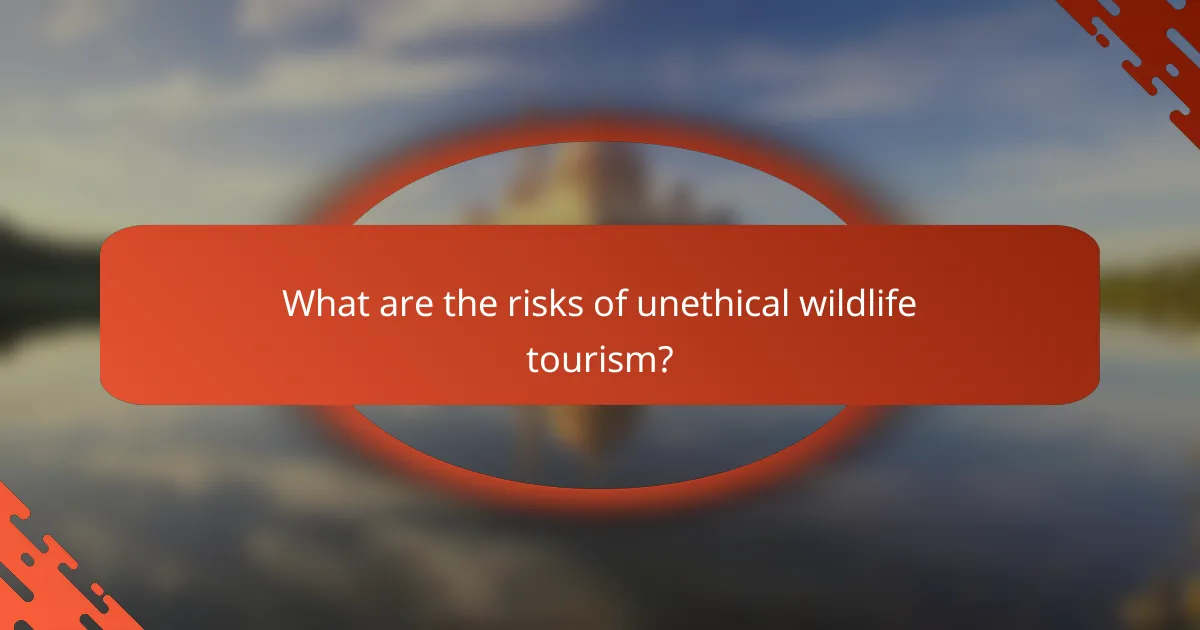
What are the risks of unethical wildlife tourism?
Unethical wildlife tourism poses significant risks to both animals and ecosystems. It can lead to habitat destruction, stress on wildlife populations, and the promotion of illegal activities such as poaching.
Impact on Wildlife
Unethical practices can severely disrupt animal behavior and health. For instance, close encounters with tourists can cause stress, leading to changes in feeding and mating habits. This disruption can diminish population numbers over time.
Additionally, wildlife that becomes accustomed to human interaction may lose their natural instincts, making them more vulnerable to poaching and other threats. Protecting natural behaviors is crucial for species survival.
Environmental Consequences
Wildlife tourism can lead to habitat degradation, particularly in sensitive areas. Increased foot traffic can damage vegetation and soil, while pollution from tourist activities can contaminate local ecosystems.
In regions where wildlife habitats are already under threat, such as tropical rainforests, the impact can be particularly severe. Sustainable practices are essential to minimize these environmental consequences.
Economic Implications
Unethical wildlife tourism can undermine local economies that rely on sustainable practices. When wildlife populations decline due to irresponsible tourism, communities may lose income from legitimate wildlife viewing opportunities.
Moreover, the costs of managing the negative impacts of unethical tourism can divert funds from conservation efforts, further jeopardizing both wildlife and local livelihoods.
Legal and Ethical Issues
Engaging in unethical wildlife tourism can lead to legal repercussions for both operators and tourists. Many countries have strict regulations governing wildlife interactions to protect endangered species and their habitats.
Tourists should be aware of these laws and choose operators that adhere to ethical guidelines. Supporting responsible tourism not only benefits wildlife but also promotes sustainable economic growth in local communities.
